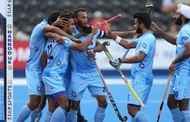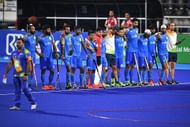India and Pakistan were declared as the joint winners of the 2018 Asian Hockey Champions Trophy as the much-anticipated final match could not even begin, with heavy rain in Muscat making the pitch deemed unplayable. This was especially disappointing from the Indian point of view as they were expected to test themselves in a high-pressure match, with an eye on the upcoming Hockey World Cup in Bhubaneswar, Odisha.
But now that the tournament is over, it’s time to reflect on the possible positives and negatives for India from this tournament.
One obvious positive was that India was the only team in the tournament that remained unbeaten. At the same time, being the highest ranked team in Asia, it was only expected of them that they should not lose to the lower ranked teams.
The second positive for India was that it continued its supremacy over the arch-rivals Pakistan. It has now managed an incredible sequence of 12 matches with Pakistan without losing even once. India has managed to win 10 of those matches, some of them rather easily. One match was tied and now we have a wash-out.
Another positive for India was the way in which the junior members of the team gelled well with the experienced seniors. After the Asian Games debacle, some senior players were dropped from the side and replaced by younger, inexperienced players. It was heartening to see that the team played as one unit, which augurs well for its prospects in the upcoming World Cup.

Making it to the final itself was an important achievement, as the Indian side had slipped at the semi-final stage in the Asian Games. So, winning the knock-out match against Japan must have helped the confidence and self-belief of the team. Scoring 9 goals against the Asian Games gold medallists, without conceding a single one in the knock-out stage, certainly made the right statement of intent.
Now, let’s look at some of the areas of concern for the Indian side, that were brought to the fore during the course of this tournament.
When the Japan coach Siegfried Aikman had said after their side’s 9-0 drubbing by India in the league stage of the ongoing Asian Hockey Champions Trophy that their side would play a very different game in the knock-out stage, it seemed mere rhetoric at the time. But the semi-final against India proved his detractors wrong. Against all odds, Japan gave an almighty scare to the Indians.
The Indian hockey team and especially its coaching staff, headed by Harendra Singh have a lot to learn from Aikman. Harendra must instill in his players the importance of living in the present and play according to plan. They must play with passion, but not emotion. Too often, the team has played like world-beaters in the league stage only to falter in the semi-final or final matches.
There is no doubt that Indian hockey is on an upswing in the last few years. They have managed to compete and even beat the top teams, but they have usually faltered at the big tournaments and big matches. The recent Asian Games debacle is an example of how a team brimming with confidence in the league stage suddenly becomes all nervous and makes rookie tactical errors.
The match against Malaysia, which ended in a draw, and even the matches with Japan in the semi-final and South Korea in the league stage which they won unconvincingly, showcased how they continue to falter in the face of a strong tactical game from an admittedly inferior opposition.

The Indian team, despite the two games in the league stage against Japan and Oman, which they won with large margins, have actually played below their potential. They have failed to convert chances and their defence has looked shaky, at times.
Even in its win against Pakistan in the league game, India had conceded a goal very early in the game. India must ensure in the World Cup matches that they don’t concede early goals as a result of which they may be forced to play catch up for the rest of the match.
Overall, it is safe to conclude that in the Champions Trophy, India has not lived up to the high standard expected of them, even though there were admittedly some positives. Before the World Cup, the Indian team should try to tie in the loose ends so that it can make a serious push for a podium finish after a long gap.
